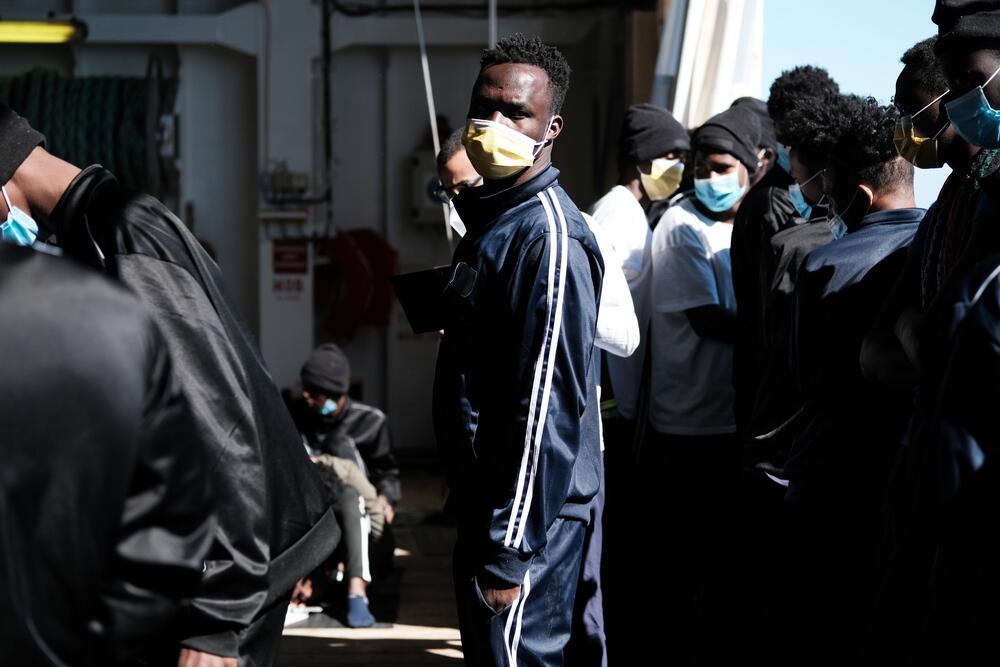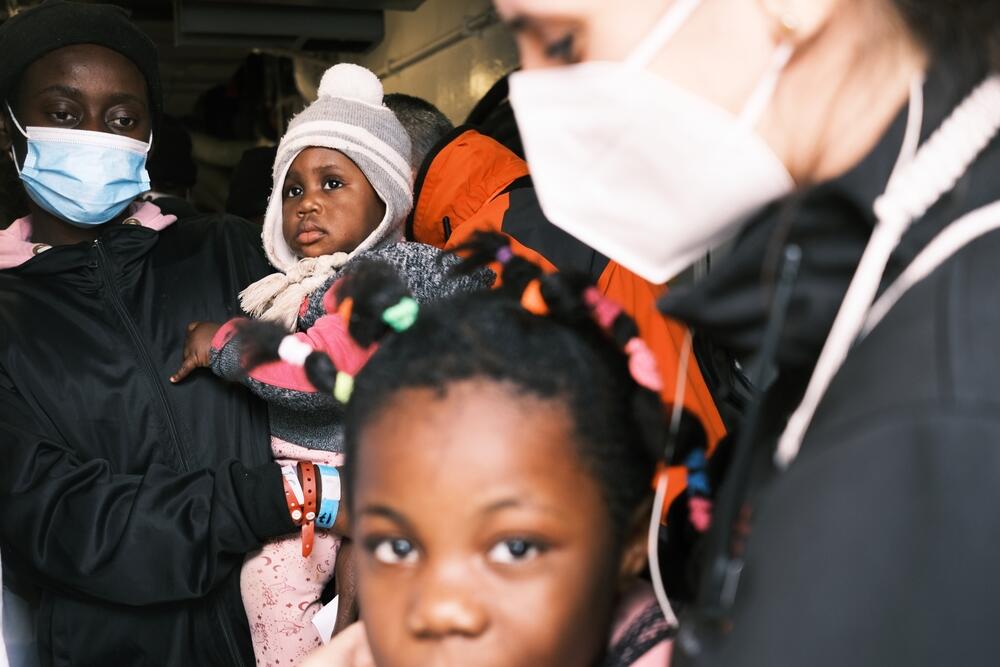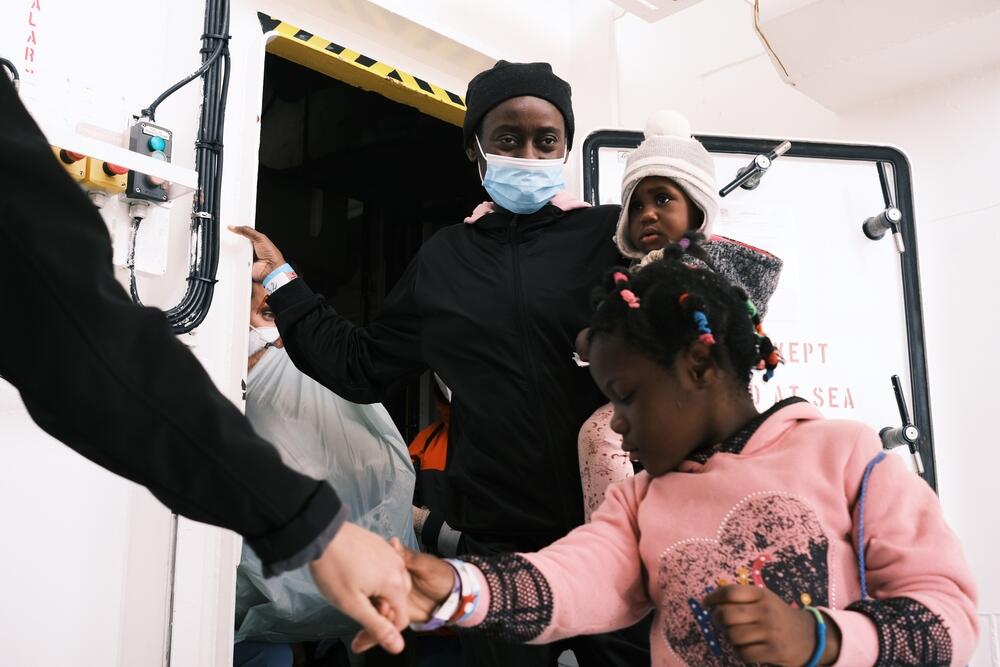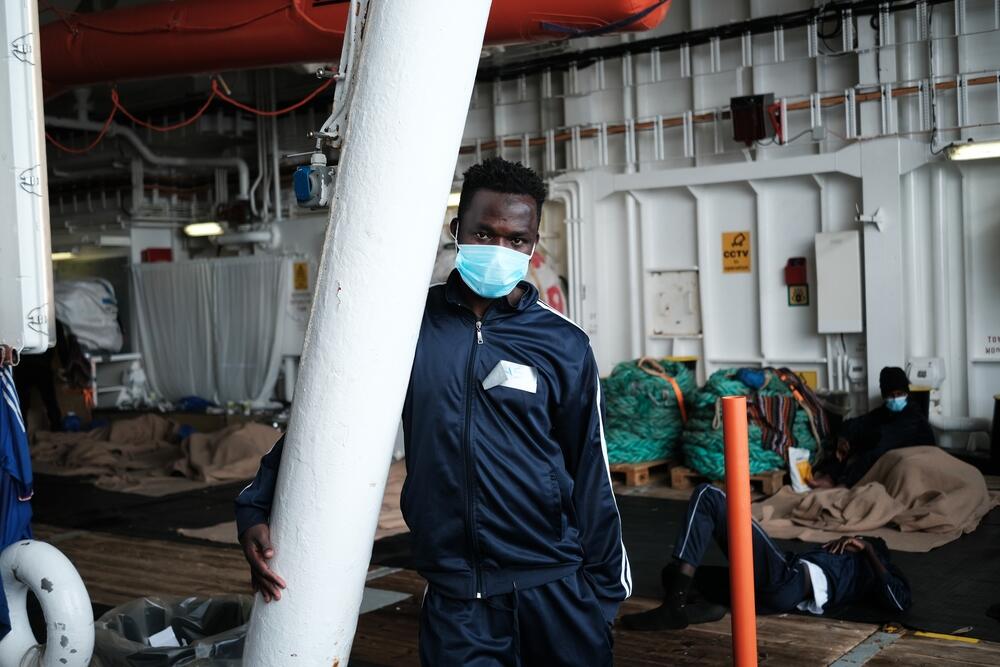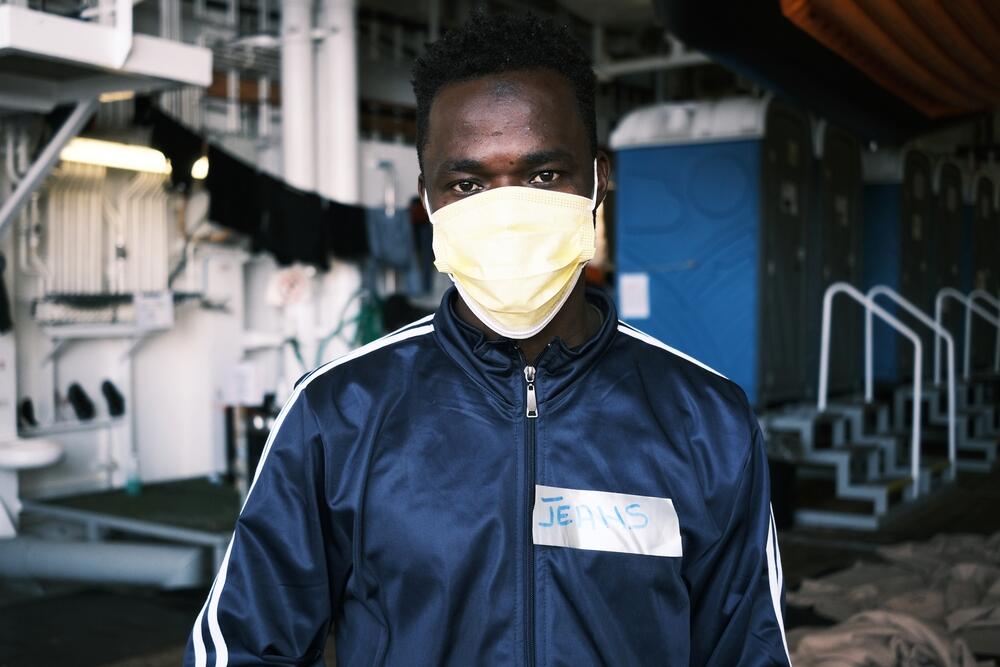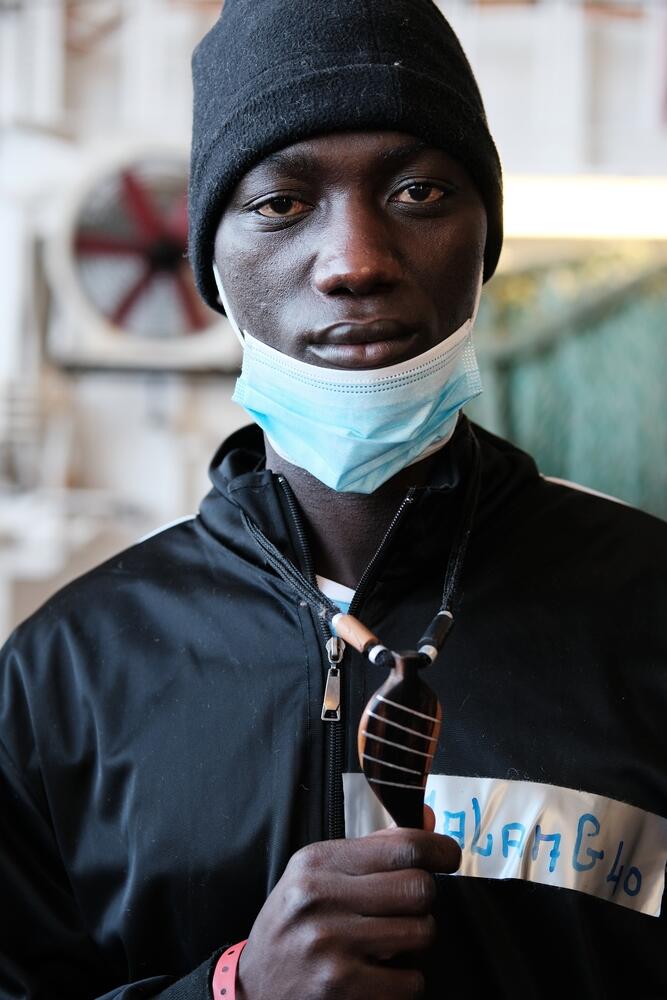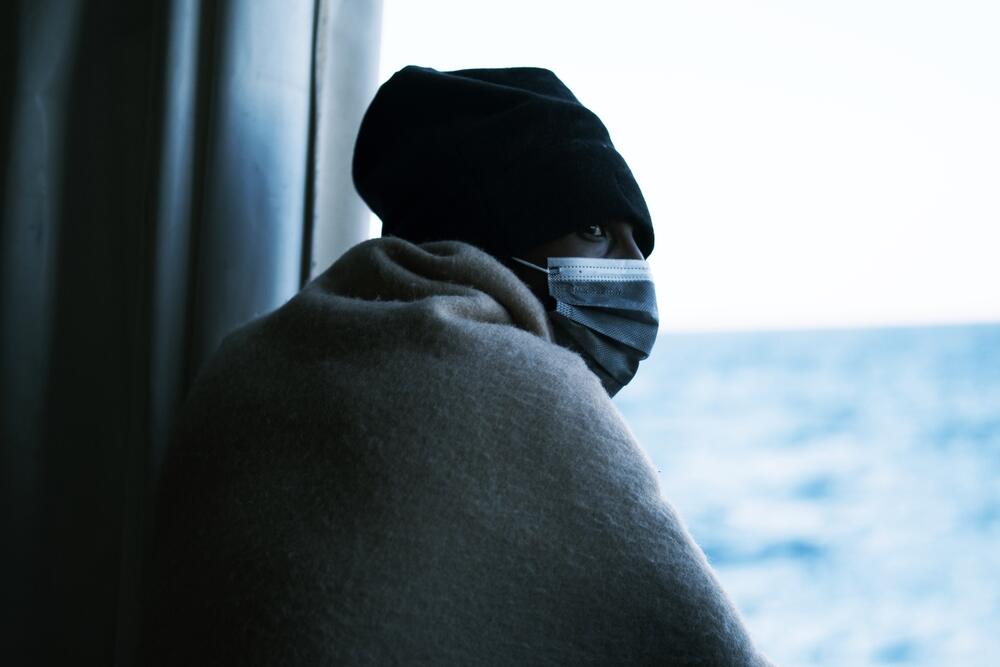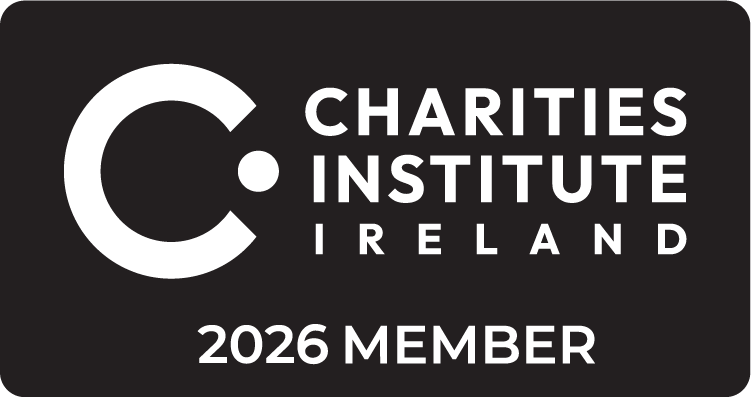Search and Rescue: Voices from the sea
25 March 2022
So far in 2022, nearly 300 migrants, asylum seekers, and refugees have died or gone missing while attempting to cross the Mediterranean Sea. In that same time period, an MSF search and rescue vessel, the Geo Barents, has rescued 550 men, women, and children in the Central Mediterranean. Considered the deadliest migration route into Europe, many of those who undertake the crossing are fleeing exterme poverty, persecution, insecurity, and lack of access to basic services and education in their countries of origin. During two search and rescue missions this year, MSF has collected stories from survivors detailing the abuse, violence, and exploitation they have experienced throughout their journeys. Here, we share the testimonies of five survivors taken on board the Geo Barents.
Fanta from Guinea Conakry is a survivor, rescued by the MSF search and rescue vessel Geo Barents from a boat in distress in the Central Mediterranean
Nayah, 32, from Cameroon attempted to cross the Mediterranean Sea with her two daughters. She was rescued by Geo Barents in March 2022.
"At the end of 2014, I gave birth to Chloe. She was born with many disabilities. I tried to help and make her life as easy as possible. It was the hardest thing I've had to do. She required a lot of attention and medication to help make her speak, which I couldn’t afford. I was lost and didn’t know how else to help my daughter. It was tearing me apart.
After two years of living in this situation, and saving up money, it was time. I had to give her better care than what was being offered to her in Cameroon. In 2016, I finally decided to leave for Europe. That became my main motivation, to help Chloe speak and to offer her a better way of life.
I left Cameroon in June 2016. First I passed through Nigeria, then Niger and then Algeria. It was a long trip. It took me about a month to pass through those three countries with Chloe. I took whatever transport I could afford: car, bus or taxi. I wasn’t going to let anything stop me. When I entered Algeria, I ran out of money. I was afraid and unsure about what to do next. So I started looking for work and found a job as a cleaner. In 2018, I was ready to go.
"The police were horrible. They took everything: the little money I had left and all my papers"
I grabbed Chloe and the little money and belongings we had and set off for Morocco, hoping to make our way across the sea to Spain. On our way to the Moroccan border, one of the people traveling with us saw the police. I was so afraid. I grabbed Chloe and ran. We ran and ran, trying to make it through the bush, but we were stopped by the Moroccan police. The police grabbed us all. There were many men and women. Suddenly a fight broke out between some of the men and the police. Three men were badly beaten, then shot and killed in front of Chloe and I. Then the police looked at me and grabbed and beat me. They kept hitting me over and over with a whip while I screamed for help. They were horrible. They took everything: the little money I had left and all my papers.
After being released we decided to travel back to Algeria, where I met a woman from Cameroon, who let Chloe and I live with her in her apartment. She owned a small restaurant and gave me a job there, helping serve food and drinks.
I spent the next three years living and working every day and trying to keep hope alive. Every day I thought about this awful life and the life I wanted for Chloe in Europe. This time, I told myself, we will not pass through Morocco; we will pass another way, which is Libya. I contacted a friend of mine living in Germany who made the crossing a couple of years ago and she gave me the number of a man to help with crossing into Libya. The smugglers are everywhere in Libya.
When I left Algeria with this man, I found out I was pregnant. I spent the next year in Libya and, months later, I finally gave birth to my second daughter. After I gave birth, this man helped move us into a home with many women. We were told to stay inside and not go out of the house. One day a smuggler came and grabbed all of us, women and men, from the house. He put us into a taxi that took us close to the shore. I could see the water. It was night. The taxi stopped and we were all rushed into a very small shack by the sea. I was afraid. There were many people inside. We stayed here for two weeks.
"I want the best for Chloe. She is the main reason I left Cameroon in the first place. She is the reason I took all these risks, so that one day Chloe will speak"
When entering the boat at sea, I was so confused. I didn’t know whether to sit or stand. I have two kids and only two arms. I held my newborn in my arms while Chloe was in between my legs. It was really tight. A lot of people were moving and shouting. Chloe kept screaming and, because I was holding my other child, I wasn’t able to protect Chloe as much as I wanted. I tried to tell Chloe to be strong and that it would be fine.
I want the best for Chloe. She is the main reason I left Cameroon in the first place. She is the reason I took all these risks, so that one day Chloe will speak. All I want is to hear her speak. I don’t want to believe this will never happen, so this is why I risked my life and hers."
Seydou, 19, is from Côte d'Ivoire and was rescued from the Central Mediterranean by the MSF search and rescue vessel Geo Barents in March 2022.
“Growing up in Côte d'Ivoire was quite difficult for my family and me. I always felt in the back of my mind that I would never have a normal childhood. You know, I was living on my own and my parents weren’t in the picture much, so I had no support and always felt responsible for everything on a daily basis. I wasn’t able to be a kid and play football with other kids my age. From the age of 12, I never attended school again. All I did was work.
At 15, my world changed. My girlfriend became pregnant and decided it was time we moved out on our own and started a life as a family. So I saved up everything I could for the next year and started on my journey to Europe when I was 16. First I headed for Mali, where I stayed for a few months; I worked in construction during the day and at night in a market, sweeping up. Then Algeria where I lived for a little less than eight months and it was very difficult to find work, so I took any job that would pay anything. Then I crossed the Sahara Desert.
The crossing was a difficult time with many critical moments. There were many men squeezed into the back of the truck, all screaming for space and fighting with one another. I hopped in and held onto a stick and didn’t look at anyone. I stayed in this position for hours. We had no water or food. After night fell, the truck broke down. All the 45 people were ordered to get out. I jumped out and sat by the back of the truck hoping another one would come or someone would be able to fix the problem. This never happened. I stayed for one week in the desert. After three days our food and water ran out. I was losing hope every passing day. A few of us saw sand kicking up from the distance and noticed it was a truck. We were saved. The driver was able to give us some water and food and offered to take us with him through the rest of the Sahara.
We arrived in the town of Debdeb, which borders Libya. The man knew a smuggler and said he would contact this man to help take us into Libya. This man also informed us that life in Libya would not be easy: there is a war and beating of black people is common. I didn’t care. I knew I had to go. I had already come this far.
"I met a younger man at one of my many jobs who said he had found a smuggler to take him to the sea. In April 2021 he left for the sea. A few days later, I heard that he and 130 others had died after their boat sank in the sea."
Once in Libya I knew I had to find a way to make the sea crossing. I found different jobs, but the pay was awful. Sometimes I would receive 10 dinars, sometimes 20. The worst was after your shift when some of the men would try to steal the money or beat you for it.
I met a younger man at one of my many jobs who said he had found a smuggler to take him to the sea. In April 2021 he left for the sea. A few days later, I heard that he and 130 others had died after their boat sank in the sea. My mind went into a panic. What should I do? I decided to pull back a bit and continue to work, as this would settle my thoughts. I worried that this too could happen to me. I could die at sea. I had so much hesitation.
After a few months, I found a smuggler and paid 400 euros. My mind was still hesitating. I had to push through it for the sake of my wife and baby back home. We left from the coast of Zawiya at 9 pm for the sea. The following day, at around 11 am, the fuel ran out and our engine stopped working. I thought this was the end and I was going to die. Then, at 6 pm, we saw a fast ship approaching us with the Libyan flag. I knew it was over. I wouldn’t get to Europe. I would be taken back to Libya.
The Libyans stopped us and threw us a line to attach to our boat and from there we all entered their ship. The Libyans took all 96 of us to a detention centre in Tripoli, then a couple of the guards separated a small group of us. From there a couple of men in high-end cars took the six of us to a house. There was no light. I was scared. I thought maybe we had been kidnapped and were going to be killed. The day after, we were told to work at a construction site. I worked night and day, no stopping, barely any food. I finally got my freedom on day three. It was a great feeling.
Immediately after being freed, I started thinking about crossing again. I was scared of being intercepted again by the Libyans, but this was the only way out of this situation. This time I was not scared of the water or of dying. Death is the destiny of all human beings.
" I still cannot believe in my mind that we were rescued and saved. Sometimes I wake up at 3 or 4 am thinking I am dreaming, that this is not real."
A few weeks went by and I paid my way to the sea. This time, the smugglers brought me to Sabratha and I was left in an abandoned building with other people. We stayed there for two weeks. There was nothing to eat or drink and we were told not to leave: if we did, there would be trouble and the route would be finished for us.
Finally the men came and took us down to the sea late in the evening. After almost 10 hours at sea we were rescued by this ship [MSF’s search and rescue vessel Geo Barents]. I couldn’t be happier to be on board here. I still cannot believe in my mind that we were rescued and saved. Sometimes I wake up at 3 or 4 am thinking I am dreaming, that this is not real. I feel grateful for everything but will be happier when I touch land in Europe. I cannot wait to call my wife and child when we reach Europe. It’s not a good feeling being away from them. Some days I feel awful about my decision, but in the end, I know I made the right one for my family.”
Aliou, 18, is from Senegal. He was rescued by the MSF search and rescue vessel Geo Barents from the Central Mediterranean in March 2022.
"I was quite scared to leave. There were even people I knew who had died on the route to Libya and on the streets of Libya.
First I left Senegal for Algeria. After a year I finally had enough money saved up to leave Algeria. I contacted a smuggler and he led me to another man who then told me about going through the Sahara. I had heard horrible stories from friends who crossed the desert. They talked about burying dead bodies and being stranded for days without any food or water.
"To not die in Libya, or in the sea, you need a lot of patience and hope. I think of my sisters and brothers who are still living in fear every day in Libya. I think of their safety.”
The desert is much, much worse than the Mediterranean or Libya, because it is a place where you have no hope. I was scared of the sun and of dying there. I started by entering a truck with 20 or so people. We were all there for the same reason: to reach Libya and cross the sea. A lot of us shared stories and spoke about our hopes. The trip took many, many hours. The truck broke down a few times and we ran out of food within hours on the road.
Finally, we entered Libya. It was night and we were told to get out of the car. It took me a month to find some work. It was again in the construction field. I knew the work would be difficult, but what else was I supposed to do? After saving up money for a few weeks, I had enough to pay my way to the sea.
There were many people at the coast, all waiting to board a boat for the sea. It was scary as it was night. We set sail and a couple of hours later, at dawn, we were caught by the Libyan coastguard. Some of the Libyan men beat people in the boat. After being taken back to Libya, the men took all of us to jail. It was rough. I was beaten. Everyone was beaten. We were given fish. One fish to split between five people. The conditions were awful.
Every day the idea that I might die came to me. I didn’t know what else to think. The only way for us to escape this country was to flee by boat. There are no other options. To not die in Libya, or in the sea, you need a lot of patience and hope. I think of my sisters and brothers who are still living in fear every day in Libya. I think of their safety.”
Bakary, 20, is from Côte d'Ivoire and was rescued by the MSF search and rescue vessel Geo Barents from the Central Mediterranean in March 2022.
“I fled Côte d'Ivoire before the 2020 elections, amid rising political tensions and fear of another civil war. I was afraid to even go out for normal things like work or seeing friends. Everyone was afraid.
I fled to Europe with a friend of mine. On entering Libya, we were immediately arrested and thrown into a jail. I spent one year there. Once released, I hid, either in Zawiyah or in Bani Walid [towns in Libya]. I didn’t go out much out of fear. Most of the time, people say that if you go out, people will kidnap you to sell you, send you to prison for no reason or worse, just to kill you where you stand.
"The [Libyan coastguard] tore up people’s belongings and their passports. Mine as well. Afterwards these men told us to get in the trunk of a car."
The first time I tried to flee by crossing the sea, our boat ran out of fuel and we were taken back to Libya by the coastguard. Once there, the men tore up people’s belongings and their passports. Mine as well. Afterwards these men told us to get in the trunk of a car. There were many cars lined up. I thought this might be where I die.
During the whole time in prison, people were crying for help. There was none. We were told to be quiet and not to talk with each other or we would be punished. People were starving. We were given small pieces of stale bread once a day and some days nothing at all. These four walls became my life. Thank goodness it’s over. Thank goodness it’s over! Thank goodness it’s over… Libya is a nightmare. There is no justice, only lots of injustice, in Libya.”
